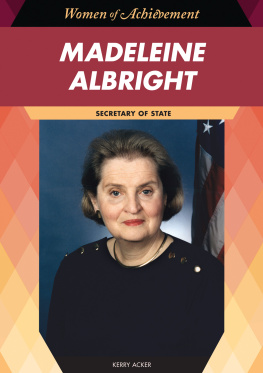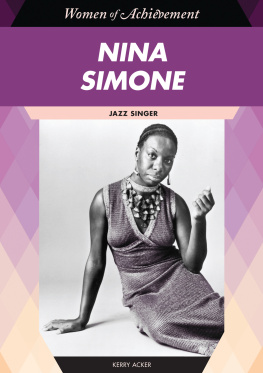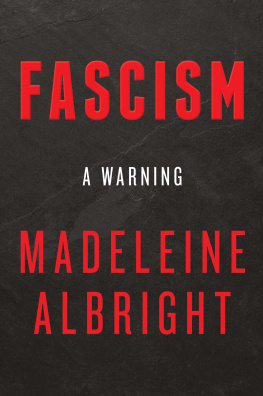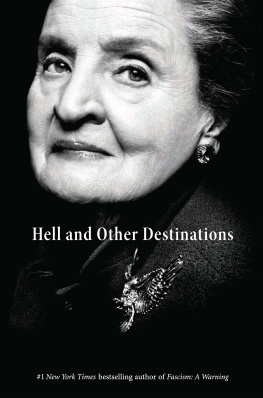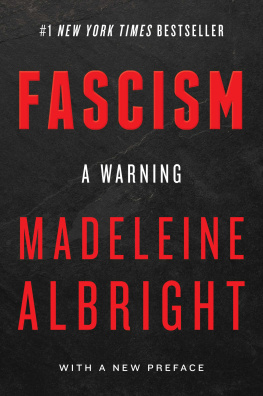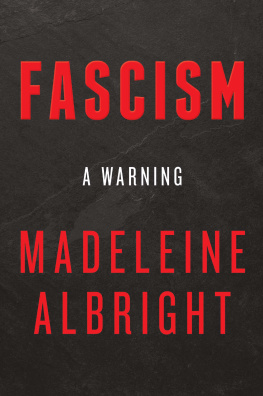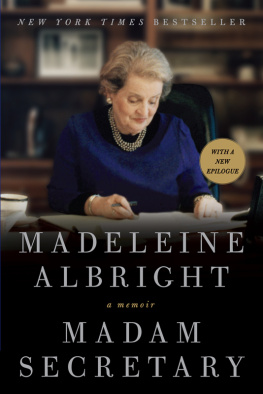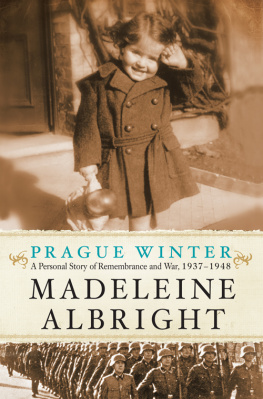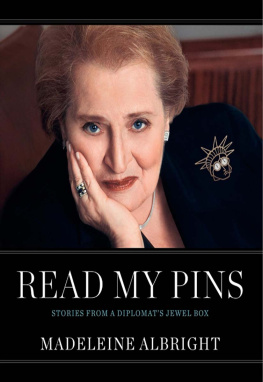Kerry Acker - Madeleine Albright
Here you can read online Kerry Acker - Madeleine Albright full text of the book (entire story) in english for free. Download pdf and epub, get meaning, cover and reviews about this ebook. year: 2014, publisher: Infobase Publishing, genre: Non-fiction. Description of the work, (preface) as well as reviews are available. Best literature library LitArk.com created for fans of good reading and offers a wide selection of genres:
Romance novel
Science fiction
Adventure
Detective
Science
History
Home and family
Prose
Art
Politics
Computer
Non-fiction
Religion
Business
Children
Humor
Choose a favorite category and find really read worthwhile books. Enjoy immersion in the world of imagination, feel the emotions of the characters or learn something new for yourself, make an fascinating discovery.
- Book:Madeleine Albright
- Author:
- Publisher:Infobase Publishing
- Genre:
- Year:2014
- Rating:3 / 5
- Favourites:Add to favourites
- Your mark:
- 60
- 1
- 2
- 3
- 4
- 5
Madeleine Albright: summary, description and annotation
We offer to read an annotation, description, summary or preface (depends on what the author of the book "Madeleine Albright" wrote himself). If you haven't found the necessary information about the book — write in the comments, we will try to find it.
Madeleine Albright tells the story of the former secretary of states
Madeleine Albright — read online for free the complete book (whole text) full work
Below is the text of the book, divided by pages. System saving the place of the last page read, allows you to conveniently read the book "Madeleine Albright" online for free, without having to search again every time where you left off. Put a bookmark, and you can go to the page where you finished reading at any time.
Font size:
Interval:
Bookmark:
Copyright 2014 by Infobase Learning
All rights reserved. No part of this publication may be reproduced or utilized in any form or by any means, electronic or mechanical, including photocopying, recording, or by any information storage or retrieval systems, without permission in writing from the publisher. For more information, contact:
Chelsea House
An imprint of Infobase Learning
132 West 31st Street
New York NY 10001
ISBN 978-1-4381-4762-8
You can find Chelsea House on the World Wide Web
at http://www.infobaselearning.com
"I never even thought about the possibility of being secretary of state before because who would have ever thought that a girl who arrived from Czechoslovakia at age 11 could become secretary of state of the most powerful country in the world?"
Madeleine Albright
When Madeleine Albright was sworn in as secretary of state on a cold winter day in January 1997, America and the rest of world watched with excitement and anticipation as history was made. No woman in U.S. history had ever held the office before. In many ways, however, it made perfect sense that Madeleine Albright had reached this point. It seemed the next logical step in her remarkable career in foreign policy. As President Bill Clinton's choice for U.S. ambassador to the United Nations, she had developed a reputation for being a tough and aggressive defender of U.S. interests. Clinton had been particularly impressed with Albright's strong, clear stance on the civil war situation in Bosnia, where Serbs were killing innocent Muslims and forcing them to flee. Adamantly opposed to dictatorships of any kind, Albright had lobbied passionately for U.S. military intervention in the region. She had also become a visible presence in the news, known just as much for her no-nonsense, blunt style, as for her witty one-liners.
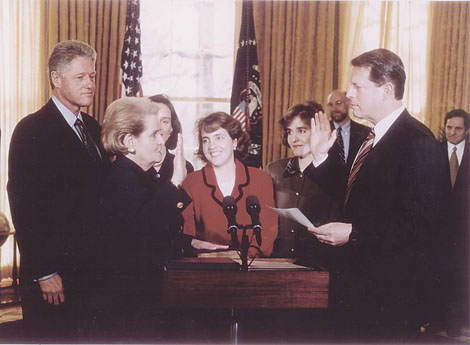
Madeleine Albright is sworn in as secretary of state by Vice President Al Gore on January 23, 1997 as her three daughters and President Bill Clinton observe. The event, which was broadcast to millions around the world, seemed to represent the best of the American dream: Albright, who had come to the United States as an eleven-year-old Czechoslovakian refugee, was now the highest-ranking woman in the history of U.S. government.
Source: Courtesy US Department of State.
Some people felt that Albright's willingness to endorse military action seemed reckless, but others admired her and respected her stridently pro-American policies. For all the criticism leveled at her, no one could argue that Madeleine Albright did not love the United States of America. Albright, the eldest daughter of a Czechoslovakian diplomat, had come to the United States as an eleven-year-old refugee. She and her family had been forced to flee her native country twicefirst to escape the Nazis and, after returning, to escape communism. The freedom that she and her family finally found in the United States endowed her with a passionate and deep appreciation for the democratic values for which America stands. Her own history, and that of her family, played a tremendous role in shaping the political ideals that would characterize her illustrious career.
A childhood spent in Belgrade, London, and Switzerland gave young Madeleine a solid grasp of the Czech, English, and French languages as well as a distinct talent for adapting and thriving in any situation. Although Albright would always feel like an outsider in some ways, she developed an uncanny ability to relate to and connect with different types of people.
When her family arrived in the United States, Albright studied at an elite private school in Colorado, where she distinguished herself from her classmates with her love of foreign policy, organizational skills, and sense of fun. After she graduated from Wellesley College, Albright married the heir to a vast newspaper fortune, Joseph Medill Albright. While raising her three children, at a time when most women were not encouraged to pursue their own careers, Madeleine Albright managed to earn a doctorate. She went on to become one of the Democratic Party's foremost foreign policy experts. By the time President Bill Clinton was elected in 1993, Albright had worked for the Carter administration and had served as an advisor to Democratic candidates Geraldine Ferraro and Michael Dukakis. She had won awards for her teaching at the Georgetown University School of Foreign Service, served as president for the Center for National Policy, and firmly established her formidable presence in the realm of international affairs. She had also raised three smart and lively young women.
After serving as U.S. ambassador to the United Nations during President Clinton's first term in office, Albright was selected by Clinton to be the first female secretary of state, the president's main advisor on foreign policy and the highest U.S. government position ever held by a woman. The Senate approved her in a unanimous vote.
Madeleine Albright's love for foreign policy began at a very young age, and much of what she believes is rooted in the history of her family, especially in the experiences of her father, Josef Korbel. Her story begins long ago in Prague, the cosmopolitan capital of Czechoslovakia, the Bohemian land whose rich and complicated past can be closely linked to Madeleine Albright's own vibrant yet painful family history.
"To be a Jew is to be constantly threatened by some kind of danger. That is our history."
Mandula Albright, Madeleine's mother
For centuries, Prague was one of the most significant Jewish centers in all of Europe. Jews have lived in the kingdom of Bohemia and Moravia (which later became parts of Czechoslovakia) since the ninth century, when Jewish trade caravans in the hills and valleys around the city dealt in such wares as grain, exotic spices, wool, tin, horses, and cattle. Yet for as long as they lived in the region, and in Europe as a whole, Jewish families were the targets of hatred and prejudice. In the eleventh century, Crusaders launched violent attacks against the Jews; those who survived were forced to convert to Christianity. By the early thirteenth century, Jews were declared slaves of the Holy Roman Empire and lost many of their rights. The pope decreed that Jews were to be separated from Christians, and a wall was built around the Jewish quarter of Prague. In the fourteenth century, Jews in Prague were victims of a vicious pogrom, a bloody and organized massacre directed against those of Jewish heritage. Claiming that Jews had desecrated the Holy Eucharist, members of the Christian clergy encouraged citizens to ransack and burn the Jewish quarter. In the fifteenth century, Jews were banished from all royal towns in Moravia.
Despite this relentless persecution, the Jewish community in Bohemia was flourishing intellectually, spiritually, and culturally by the late sixteenth and early seventeenth centuries. During this period, known as the Golden Age of Prague, Jews were granted some economic freedom, and a great number of them became successful businessmen. Others became scientists, historians, philosophers, and artists. In 1781, the Hapsburg (the Austrian dynasty that ruled over Bohemia from 1526 to 1918) emperor, Joseph II, declared that Jewish people were "almost equal" to Christians. This "almost equality" came at a high price. Jews would have to stop speaking their traditional language, Yiddish, and instead speak German, the official language of the empire. They would have to be educated in Christian-run schools and wear Christian-style clothing. (The Hapsburgs had instituted an empire-wide policy of Germanization. Under this policy, both Christian and Jewish Czechs were marginalized.) It wasn't until the mid-nineteenth century that Jews regained their full civil and political rights. Thus began another period of intellectual and creative growth in Jewish Bohemia. The era produced such prominent Jewish figures as the writer Franz Kafka, the composer Gustav Mahler, and the founder of psychoanalysis, Sigmund Freud.
Font size:
Interval:
Bookmark:
Similar books «Madeleine Albright»
Look at similar books to Madeleine Albright. We have selected literature similar in name and meaning in the hope of providing readers with more options to find new, interesting, not yet read works.
Discussion, reviews of the book Madeleine Albright and just readers' own opinions. Leave your comments, write what you think about the work, its meaning or the main characters. Specify what exactly you liked and what you didn't like, and why you think so.

